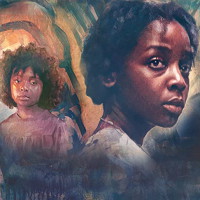Amazon UNDERGROUND RAILROAD Q&A Barry Jenkins, Thuso Mbedu; Overview, Production Notes, Ep Guide
Maj Canton - May 13, 2021
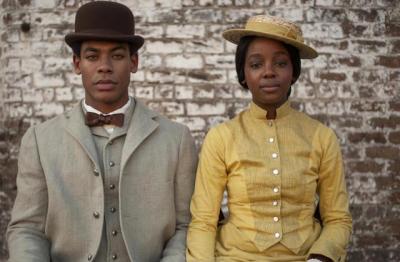
On Friday, May 14, 2021 Amazon Prime Video premieres THE UNDERGROUND RAILROAD, based on the Pulitzer Prize-winning novel by Colson Whitehead and directed by Barry Jenkins. This powerful limited series chronicles Cora Randall’s (a tour de force performance by Thuso Mbedu) desperate bid for freedom in the antebellum South. After escaping a Georgia plantation for the rumored Underground Railroad, Cora discovers no mere metaphor, but an actual railroad full of engineers and conductors, and a secret network of tracks and tunnels beneath the Southern soil. Over the course of her journey, Cora is pursued by Ridgeway (Joel Edgerton), a bounty hunter fixated on bringing her back to the plantation she escaped; especially since her mother Mabel is the only runaway he has never caught. As Cora travels from state to state, she contends with the legacy of the mother that left her behind and her own struggles to realize a life she never thought was possible. The change in setting that comes with almost every episode serves as a window into Cora’s state of mind. Rather than the traditional serialized structure that returns to the same world and characters with each episode, we see Cora and her landscape evolve over the course of the series. The Underground Railroad was filmed in numerous locations and cities across the state of Georgia, including Savannah and Atlanta, over 116 days. Said Barry Jenkins, “When I was a child, a teacher spoke the words “Underground Railroad” and I saw images of Black folks building and working and thriving on vessels of their own creation far beneath the ground. In that moment, everything felt possible. Despite the shoddy conditions of my impoverished life at the time and what felt like a constant closing, the entire world opened to me. In that moment, I placed no limitations on my ancestors and the magic they were capable of making. To this day, it is the one of the most whole feelings I’ve experienced in my forty-one years of life. For me, this show is a return to that feeling with the eyes of an adult in place of the innocence of a child, a memory of conjuring soft images where hard ones were stricken from the record, hidden from view. This balancing act, the tension.”
While at times this series is painful to watch (maybe not something to binge) -- don’t stop. Watch an episode or two, take a break and continue on. You will be rewarded with a series that is riveting and too important not to see.
The series stars Thuso Mbedu, Chase W. Dillon and Joel Edgerton. Aaron Pierre, William Jackson Harper, Sheila Atim, Amber Gray, Peter De Jersey, Chukwudi Iwuji, Damon Herriman, Lily Rabe, Irone Singleton, Mychal-Bella Bowman, Marcus "MJ" Gladney, Jr., Will Poulter and Peter Mullan are also set to star, with Barry Jenkins directing all episodes.
Q&A with BARRY JENKINS AND THUSO MBEDU
Last week TV Tango participated THE UNDERGROUND RAILROAD virtual press event with Producer/Director/Writer Barry Jenkins and series star Thuso Mbedu. Here are a few highlights (edited for clarity and readability) from that event. .
|
|
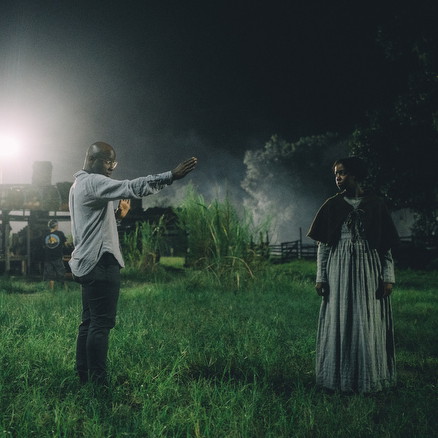 |
Question: Barry, How to you go about cast for the role of Cora? Barry Jenkins: I have an open-door policy when it comes to casting these projects. And if you can show me that you are the character, then the part is yours. When Thuso's tape came through, I recognized immediately that she had this ability knowing that this character was gonna start in a place where she didn't have full possession of herself and would go through the process of gaining possession of herself. In the early part, she has to be able to emote, with her face, with her shoulders, with her posture. And Thuso very clearly was capable of that. Thuso Mbedu: When I heard of the audition, it was something exciting for me, 'cause it would've been my very first big international audition. I didn't think anything would come from it. I did the tape, you know, put it the on the table and sort of just forgot about it. It's a very important story. And I would love to tell the story. I don't know if I have it in me to tell the story. But, you know what, I'll do what I need to do, and the rest is in God's hands. The rest is in Barry's hands. And yeah, we had the test shoot. Barry was amazing. Oh, Barry worked me. He worked me so hard, my contact lens flipped in on itself. |
|
|
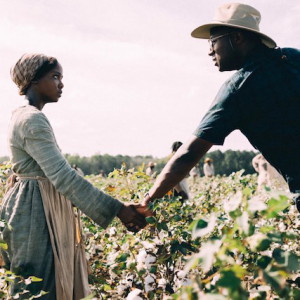 |
Question: How important was that to the process of bringing this to the screen, knowing how real you needed to portray it, but also to be able to make sure that yourself and everyone else was okay? Barry Jenkins: It was as important as getting the scene right. It was probably even more important because it's not worth creating these things if it's going to destroy us, in the process. We had a therapist on set at all times, Miss Kim White. We also had each other. I think everyone knew they had the freedom to decide for themselves, at what point they felt like they were close to the line, or at what point something I was asking them to do, or even as performers, that they were asking of themselves and the character, at what point is this not worth it? Because I can't be destroyed in the process of replicating such a destructive event or happening. |
|
|
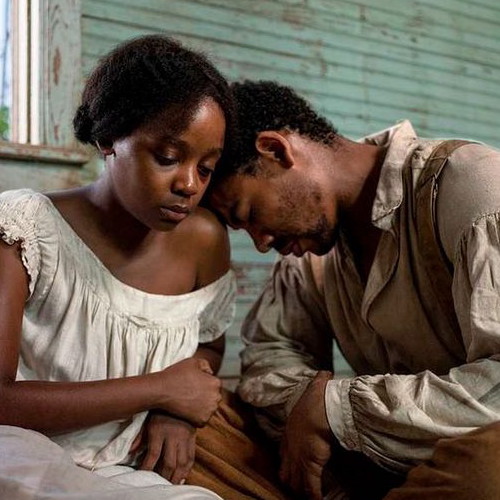 |
Question: What was it like seeing those trains and stepping into that imagination? What was the most moving, moment for you on this set? Thuso Mbedu: The first couple of days on set -- if not the very first day -- where everything was bigger than anything I could've imagined that, at some point, you know you're supposed to report to the PAs if you go anywhere. They need to know where you are, but at some point, I actually like snuck away just to step back and take in everything that I was seeing unfold before me. I felt like I was in the presence of brilliance, you know. Everyone on the crew, everyone in the cast, it was amazing to take in. And then seeing the different types of trains, you know, that Cora rides in from, you know, Georgia. It's like this rickety, boxcar, barely holding it together to then Indiana later on when it's this big, grand, majestic thing. It was a journey in itself. |
|
|
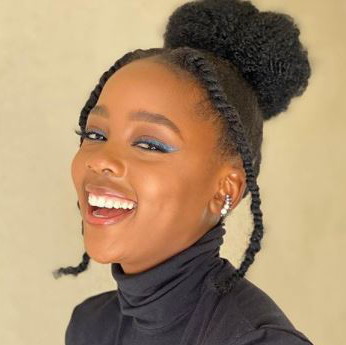 |
Question: Who are some of your acting inspirations? Thuso Mbedu: Definitely Viola Davis, Angela Bassett, Meryl Streep....the veterans who you see that there is a process that they go through in preparation. But when they get to set they throw it away and dive in 100 percent. |
|
|
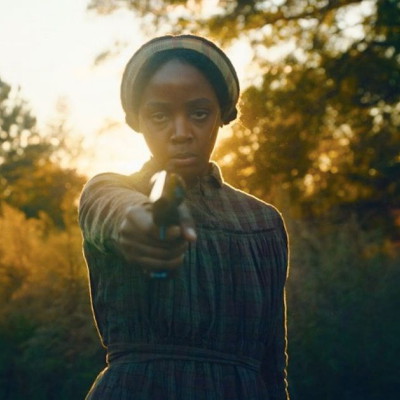 |
Question: What did you learn about each other during the shoot about acting and collaboration in particular? Thuso Mbedu: I think alluding to the whole being safe and trusting the people around you thing, I appreciated that there was no incorrect offer when it came to working with the cast. It was like, okay, we're here to play, we know the objective, we know the goal. There are certain, boundaries or whatever rules to the game. But we can play this game in any way. I don’t have to pre-judge myself because I know that I trust the person that I'm working with. And you know that you could take each other's hands and take the leap and go further than you could have imagined. |
|
|
PRODUCTION OF THE SERIES
The series was filmed over 116 days in numerous locations and cities in Georgia, including Savannah and Atlanta. After her escape, Cora travels from Georgia, to South Carolina, to North Carolina, to Tennessee, and then finally to Indiana. The challenge was telling a cross-country story while not leaving Georgia. Director Barry Jenkins surrounded himself with a team he has trusted in the past on his features – cinematographer James Laxton, production designer Mark Friedberg, and costume designer and Caroline Eselin. It was important for Laxton when reading the book and initially in talks with Jenkins, that they convey a sense of scale. “From the beginning, my aim was to find a sense of scale, scope and mythology, because Cora’s journey is very long and arduous. Explains Jenkins, “The tone of this series shifts. The book and the show are a representation of our main character’s state of consciousness. That’s why she goes from state to state to state and, the show, episode to episode, changes in the visual aesthetic. It changes in the sonic aesthetic. Just the feeling of it changes from condition to condition, from state to state and it creates this rainbow of tones.” Hair designer, Lawrence Davis, adds, “Cora’s hair definitely tells where she's been or where she's going. As we see her from episode to episode, there's definitely a shift in her look.”
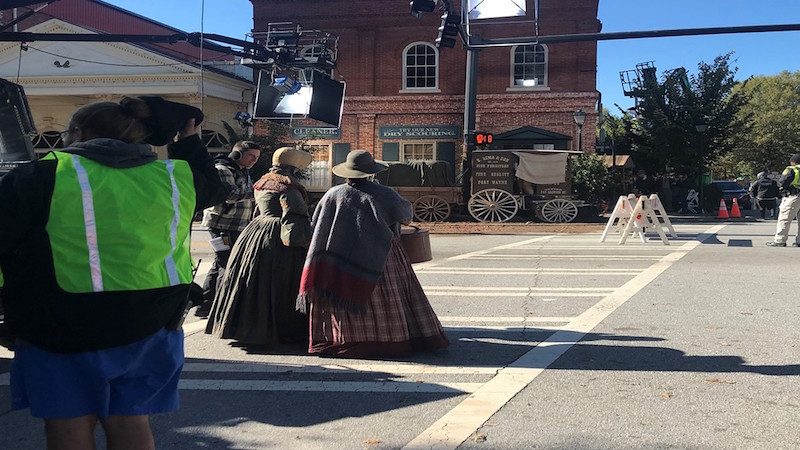
A lot of the series takes place on trains in 1850 that run underground. “Those don't exist,” says production designer Friedberg. “They never did. Steam trains don't run underground.” In Savannah, Friedberg and the team found a train museum. “My idea was the way to solve an underground train station is not to build one underground, but to build the underground above ground, to create a tunnel that felt like it was underground and through the stations is how we connect to the above ground.” “It was complicated,” Friedberg continues. “It's also not like normal walls that are rectangular shapes or things you can measure. Its rocks that we had to find local talent to be able to do that and paint to make them look real. And then the trains, we even worked on those as well, that the people at the Savannah Railroad Museum let us work with them to slightly modify the trains, both to make them period, but also to make them in keeping with our story.”
CASTING THE CHARACTERS
Gathering a cast from around the globe who can speak to the unique facets of the Black experience and bring that to the table offers a richness to the performances, and comradery on set. Says Jenkins, “We’ve charted all these different swatches of color in the African diaspora in this show and in building the cast, I really sought that. On set, you could feel that we all had these different cultures we had been raised in and yet, in working on the material, there was this single place that we all felt connected to. To me, it’s one of the most successful things about the show.” The main character, Cora, is played by Thuso Mbedu, who is from South Africa. With the entire series revolving around Cora’s journey, it was vital to find the right actor. In casting Cora, Jenkins had an open mind. “I’m always looking for someone to show me who the main character is,” he explains. “I think the beauty of adapting a book is there are no pictures and so, I might read the novel and see Cora one way. You might read it and see her a different way.”
For Ridgeway, the bounty hunter pursuing Cora, Jenkins wanted someone who had a very fully realized humanity, and he got that in Joel Edgerton. “Ridgeway is a very, very complicated character and I needed a very complicated man to play him. Joel is a wonderful human being filled with complex talents.” And he needed someone who would have good rapport with the sidekick kid, Homer. Barry loves actors, and that’s being sort of proven on set. He lets you off the leash a lot. He watches what you do and when he sees something, he asks you to move in that direction maybe more, so there’s a certain freedom.”
Homer (left) and Ridgeway (right) in THE UNDERGROUND RAILROAD.
Homer was one of the more challenging roles to cast. “Homer’s just a boy and yet, carries the weight of so many very adult actions and inactions. And Chase Dillon, he walked in and he gave this audition and he put his little hat on, and I was like, oh, yeah, that’s the guy. And when he and Joel first met, when they got together, it was very clear, those were the guys.” Eleven-year-old Chase Dillon considers the Ridgeway/Homer relationship as a caring, familial one. He says, “Homer really cares about Ridgeway and they take care of each other, like they tie each other’s ties, they dress each other up. They do everything together and the mission that they’re on is trying to catch Cora.”
Although some characters only appear for a short period of time, their presence is woven into the narrative of the series and resonates throughout. The two characters whose presence is particularly felt in this way are Caesar (Aaron Pierre) and Royal (William Jackson Harper). In Caesar, Jenkins wanted someone who would leave a profound impact on the audience. He says, “Aaron is just the most amazing human being and maybe it is a bit manipulative because I wanted the audience to look into his eyes and when he’s gone, for them to deeply, deeply miss him, because the character Cora misses him as well.” On casting William Jackson Harper as Royal, Jenkins recalls, “You read a novel and you hear the character’s voice in your head and from the moment that dude started talking, I was like, oh, that’s Royal.
EPISODE GUIDE
"Chapter 1: Georgia": When Caesar convinces Cora to escape from the Randall plantation in Georgia, their lives are irrevocably changed. Together they discover the impossible in an underground railroad which takes them on an unexpected journey that reveals the true face of America. |

